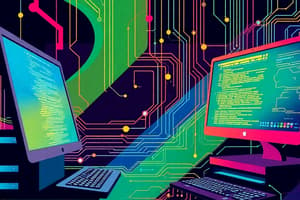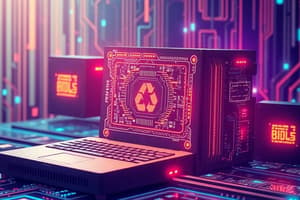Podcast
Questions and Answers
What is the primary role of system software?
What is the primary role of system software?
- To directly provide applications for end-users.
- To replace the need for computer hardware.
- To create documents, spreadsheets, and presentations.
- To enable application software to interact with computer hardware. (correct)
Which of the following is NOT a listed component of an information system?
Which of the following is NOT a listed component of an information system?
- People
- Procedures
- Algorithms (correct)
- Hardware
What does 'computer competency' primarily involve acquiring?
What does 'computer competency' primarily involve acquiring?
- Advanced programming skills.
- The ability to build a computer from scratch.
- Computer-related skills. (correct)
- A deep understanding of computer architecture.
Which of the following best describes 'Information Technology' (IT)?
Which of the following best describes 'Information Technology' (IT)?
Which of the following is the most accurate description of a computer?
Which of the following is the most accurate description of a computer?
In the context of computer hardware, what does the term 'system unit' refer to?
In the context of computer hardware, what does the term 'system unit' refer to?
Which of the following is the best description of cloud computing?
Which of the following is the best description of cloud computing?
What is the primary function of an operating system?
What is the primary function of an operating system?
How does the course 'Foundations of Digital Technology' aim to prepare students?
How does the course 'Foundations of Digital Technology' aim to prepare students?
Which sequence accurately represents the fundamental operations of a computer?
Which sequence accurately represents the fundamental operations of a computer?
What is the key distinction between application software and system software?
What is the key distinction between application software and system software?
A company is deciding whether to invest in mainframe computers or a network of microcomputers. What is a primary factor they should consider?
A company is deciding whether to invest in mainframe computers or a network of microcomputers. What is a primary factor they should consider?
In the evolving landscape of digital technology, what presents a significant challenge regarding personal information?
In the evolving landscape of digital technology, what presents a significant challenge regarding personal information?
How has the widespread adoption of the internet impacted traditional learning environments?
How has the widespread adoption of the internet impacted traditional learning environments?
Which of these components of an information system is most crucial for tailoring technology to meet organizational needs and strategic goals?
Which of these components of an information system is most crucial for tailoring technology to meet organizational needs and strategic goals?
How do microcomputers differ fundamentally from mainframe computers in their architecture and operational use?
How do microcomputers differ fundamentally from mainframe computers in their architecture and operational use?
Imagine a scenario where an organization transitions from traditional client-server architecture to a cloud-based infrastructure. What critical shift in IT resource management is the organization likely to experience?
Imagine a scenario where an organization transitions from traditional client-server architecture to a cloud-based infrastructure. What critical shift in IT resource management is the organization likely to experience?
Consider a future where quantum computing becomes mainstream. How might this breakthrough most significantly impact current encryption methods used to secure online data transmissions?
Consider a future where quantum computing becomes mainstream. How might this breakthrough most significantly impact current encryption methods used to secure online data transmissions?
A large enterprise is evaluating the trade-offs between maintaining an in-house data center and migrating to a fully serverless architecture on a public cloud. What is a key differentiating factor that the enterprise must carefully assess?
A large enterprise is evaluating the trade-offs between maintaining an in-house data center and migrating to a fully serverless architecture on a public cloud. What is a key differentiating factor that the enterprise must carefully assess?
If the Helawn University, Faculty of science, Math. Dept. publishes the second edition of 'Foundations of Digital technology' in the year 2030, what would be the publication year cited in the reference?
If the Helawn University, Faculty of science, Math. Dept. publishes the second edition of 'Foundations of Digital technology' in the year 2030, what would be the publication year cited in the reference?
Flashcards
What is a computer?
What is a computer?
A general-purpose, programmable device that is capable of calculating and storing results.
What is Hardware?
What is Hardware?
Physical components of a computer, such as the system unit, mouse, keyboard, and monitor.
What is Software?
What is Software?
Instructions that make the computer behave in a given way. Stored on hard disks, CDs, DVDs, or RAM.
What is Information Technology (IT)?
What is Information Technology (IT)?
Signup and view all the flashcards
Who are People in an Information System?
Who are People in an Information System?
Signup and view all the flashcards
What are Procedures in an Information System?
What are Procedures in an Information System?
Signup and view all the flashcards
What is Software in an Information System?
What is Software in an Information System?
Signup and view all the flashcards
What is Hardware in an Information System?
What is Hardware in an Information System?
Signup and view all the flashcards
What is Data in an Information System?
What is Data in an Information System?
Signup and view all the flashcards
What is Connectivity in an Information System?
What is Connectivity in an Information System?
Signup and view all the flashcards
What is System Software?
What is System Software?
Signup and view all the flashcards
What does System Software do?
What does System Software do?
Signup and view all the flashcards
Hardware – Types of Computers
Hardware – Types of Computers
Signup and view all the flashcards
What are Microcomputer Types?
What are Microcomputer Types?
Signup and view all the flashcards
What is Connectivity?
What is Connectivity?
Signup and view all the flashcards
Computer Networks
Computer Networks
Signup and view all the flashcards
What is Cloud Computing?
What is Cloud Computing?
Signup and view all the flashcards
Study Notes
- UR5: Foundations of Digital Technology is the title of the course.
- Dr. Rashad Ragab from the Math Department at Helwan University is the instructor.
- Email address is [email protected].
Course Outline
- Introduction to computer and information systems will be covered.
- Types of computers will be taught.
- Computer hardware and software components will be examined.
- Introduction to networking will be provided.
- Introduction to the Internet will be covered.
Lecture Outlines
- The parts of an information system include people, procedures, software, hardware, data, and the Internet.
- A distinction can be made between system software and application software.
- The three kinds of system software programs can be differentiated.
- General-purpose, specialized, and mobile applications can be defined and compared.
- The four types of computers and the five types of personal computers can be identified.
- The different types of computer hardware include the system unit, input, output, storage, and communication devices.
- Data definitions and descriptions include document, worksheet, database, and presentation files.
- Computer connectivity, the wireless revolution, the Internet, cloud computing, and IoT will be explained.
Grading
- Homework and practical assignments are worth 20% of grade.
- Projects and attendance comprise 10% of grade.
- Midterm exam 1 is 10% of grade.
- The final exam is 60% of grade.
Reasons for Taking This Course
- Powerful software and hardware systems are transforming human interaction daily.
- The course is designed to provide the skills and concepts to navigate digital environments.
Introduction to Digital Technology
- Computer competency refers to acquiring computer-related skills.
- Information systems have become pervasive in daily life.
- Microcomputers are common in all areas of life.
- New forms of learning provide educational alternatives without physical attendance.
- The Web facilitates purchasing, communication, and interest sharing.
General Concepts
- A computer is a general-purpose, programmable device that calculates and stores results.
Basic Computer Components
- Input involves feeding data into the computer.
- Processing is what the computer does with the data.
- Output is the result of the data.
Hardware, Software, IT
- Hardware refers to the physical parts of a computer, such as the system unit, monitor, keyboard, and mouse.
- Software is a set of instructions that dictates how a computer behaves.
- Software can reside on a hard disk, CD-ROM, DVD, or diskette.
- Software is loaded from the disk into the computer's RAM when needed.
- Information Technology (IT) encompasses all technologies for creating, storing, exchanging, and using information in various forms.
- IT includes business data, voice conversations, images, multimedia, and future technologies.
- IT includes both telephony and computer technology.
Parts of an Information System
- Key components are people, procedures, software, hardware, data and connectivity.
- People are the end users who operate computers to enhance productivity.
- Procedures are guidelines for computer operations.
- Software provides step-by-step instructions for the computer hardware.
- Hardware includes devices like the keyboard, mouse, monitor, and system unit.
- Data consists of raw facts, including text, numbers, images, and sounds.
- Connectivity enables computers to share information and access the Internet.
The Importance of IT Professionals
- The most important element of any system is the people involved.
- Computer use is direct or indirect though entertainment, business, medicine and education.
System Software
- System software enables application software to interact with computer hardware.
- Background software manages resources.
- System software is a collection of programs, including operating systems, utilities and device drivers.
- Operating system does three things: coordinates computer resources, provides the user interface and runs applications
Types of Computers
- Varieties include supercomputers, mainframe computers, midrange computers, microcomputers, servers, and workstations.
Microcomputer Types
- Options include desktop, notebook, tablet PC, and handheld devices.
Connectivity & The Internet
- Connectivity enables information sharing.
- Wireless communication is very common.
- Computer networks are connected communication systems.
- The largest network is the Internet.
- Cloud computing allows users to shift computer activities from their devices to computers on the Internet.
Future IT Developments
- The future may see changes in the Internet, the Web, software, hardware, security, privacy, organizations and changing times.
Studying That Suits You
Use AI to generate personalized quizzes and flashcards to suit your learning preferences.



